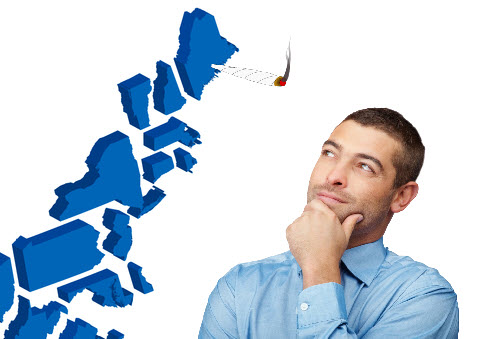
How did Maine solve the biggest mystery between the legal cannabis market and the illegal market?
The majority of Mainers procure cannabis legally
According to the state report, the growth and development of Maine’s legal cannabis market has displaced a larger percentage of illegal ones. As it stands, a survey conducted by the State Office of Cannabis Policy (OCP) concluded that most Mainers buy their cannabis from legitimate dispensaries.
The survey found that around 64% of cannabis users have purchased cannabis products from legitimate stores in the past month. On the other hand, it was confirmed that 36% buy cannabis products from illegal sources.
The survey also found that 6% of respondents who use marijuana every month only purchased from licensed dispensaries. Meanwhile, the number of respondents who bought exclusively from illegal sources was around 1%.
The agency also found through the survey that the state has an oversupply of medicinal cannabis just a year after recreational cannabis started selling in Mainers. In comparison, for every $6 supply of medicinal cannabis, there is a demand of about $1 for a supply of recreational cannabis of $2 for a demand of about $1.
The oversupply in the medical marijuana market is evident despite the fact that 33% of consumers who purchased cannabis products from healthcare providers or dispensaries and 54% of consumers who purchased cannabis from home caregivers do not have a medical cannabis card.
In-depth survey analysis
According to the OCP’s findings, the state’s illicit cannabis market has shrunk sharply compared to other states, considering when Maine’s very first recreational cannabis store opened. This implies that Maine is significantly more effective in curbing the illicit recreational market compared to other legalized states.
The report also showed how market dynamics, health outcomes, and cannabis use differed by geography and other diverse variables. The study also found that the existence of a recreational cannabis business in a user’s zip code can help them find cannabis at a reduced price on the legal market.
According to respondents who have purchased cannabis from legal cannabis stores, they have not experienced any adverse health behaviors such as DUI or cannabis use disorder. These behaviors are now reported to be exhibited by users who purchase cannabis for illegal markets.
This OCP survey is the first of its kind, with approximately 2,000 respondents from 262 zip codes across the state. The survey was conducted in partnership with Advocates for Human Potential Inc., led by Michael Sofis, Researcher in Use and Cannabis Demand.
According to Erik Gundersen, director of OCP, the agency is pleased to release the report, which highlights the achievements and success of the Maine recreational cannabis market. He added that the report’s conclusions propose practices and policies that maintain and promote public health safety. An initiative that will allow legal cannabis companies to compete.
To date, there are approximately 90 active recreational cannabis stores in 34 state cities. In 2022, retailers achieved a feat of $82 million in recreational cannabis sales, compared to $4.3 million in 2020. So far this year, records have shown that recreational cannabis sales in Maine were approximately $51 million -dollars, already surpassing last year’s performance.
According to Sofis, the report’s findings and conclusions indicate that establishing the recreational cannabis market in Maine should be considered a success. Especially in the field of cannabis policy and public health safety.
The survey also shed some light on the THC awareness of cannabis users. The survey revealed that 28% of consumers who have used cannabis in the past month are unaware of the THC content of the product they have purchased. Another 9% confirmed that the product they consumed had greater than 50% THC content. Meanwhile, 11% said between 25-35%, 4% said yes, 35-50%, another 4% said less than 10%, and 8% said between 10-15% THC.
When it comes to cannabis products of choice among Mainers, flowers top the list, with 82% of respondents saying they’ve bought them in the past month. Edibles came next at 58% and then concentrated at 41%. Other preferred products are lozenges (7%), tinctures (17%), sprays, balms, creams and topical (21%) others (11%).
Cannabis reforms in Maine
In late 2016, Maine became the first state on the East Coast of the United States to legalize adult use of marijuana. After a seemingly never-ending drama from ex-governor Paul LePage rejecting multiple legislative attempts to push through the voter-approved legalization proposal — including some bureaucratic delays — recreational cannabis was finally legalized and ready for trade in 2020.
Since legalizing recreational cannabis, the state has broken various sales records as consumers continue to acclimatize to the legitimate cannabis market.
In addition to the established recreational cannabis market in Maine, the state is also developing its medical cannabis market. Maine first legalized medicinal cannabis in a 1999 referendum. In 2009, voters established a medical cannabis program and legitimate distribution channel that started in 2010. Subsequently, in 2011, the first dispensary for medical cannabis was opened.
Since its inception, Maine’s medical health insurance programs have grown from a small industry of 600 nurses and 8 pharmacies to approximately 3,000 nurses and 13 pharmacies. Maine’s medical marijuana market has grown rapidly. In fact, medical cannabis was considered Maine’s most lucrative product of 2020.
Industry Overview
Legal cannabis dispensaries are scattered throughout Maine, providing citizens with safer cannabis products compared to the illicit market. Currently, recreational cannabis sales in Maine are subject to an excise tax rate of 10% and a standard sales tax of 5.5%. However, the sale of medicinal cannabis is not taxed.
On the other hand, legal cannabis growers pay an excise tax rate of $335 per pound of flower, $1.50 per pound of cannabis seedlings, $0.35 per pound of cannabis seeds, and $94 per pound of cannabis trimmings.
Conclusion
Expectations for Maine’s legal cannabis market are high, as records have shown that recreational cannabis sales in the state have reached approximately $51 million, already beating the state’s performance the previous year. With more Mainers expected to turn to state-licensed dispensaries to obtain their cannabis products, many expect the current number to double before the end of the year.
MORE ABOUT MAINE WEED, READ THIS..

CANANBIS CAN NOW BE THE FUTURE OF TOURISM IN MAIN!
OR..

MAINE BLUEBERRIES ARE ALREADY MISSED BY MARIJUANA?

Post a comment: